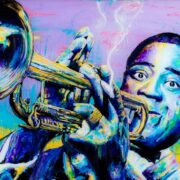Terence Blanchard: Of Opera and Jazz

by Leslie Cardé
WHEN TERENCE BLANCHARD’S OPERA, “Fire Shut Up in My Bones,” opened the 2021-22 season of New York’s Metropolitan Opera this past fall, it was the first time in the Met’s 138-year history that a Black composer’s work would be presented by the famed opera house. It was one more stunning turn in a long line of accolades that have been bestowed upon the New Orleans musician, including six Grammys and two Oscar nominations.
Perhaps, not surprisingly, Blanchard is the product of a musical family. His father loved opera and sang at recitals and in the family’s church. His mother taught music. His early recollections of Christmas were of his parents caroling all over the city of New Orleans. But his rise to storied jazz trumpeter, musician behind countless film scores, and in the last decade an opera composer, took a circuitous route for the boy who started piano lessons at the age of five.
“I was plunking along on the keyboard at my grandparent’s when my parents thought I should probably take some lessons,” recounts Blanchard. “I was doing fine, but my whole world changed when Alvin Alcorn came to my elementary school to perform at our assembly. I was hooked on the sound… he was a trumpeter.”
For a time, Blanchard studied both instruments, getting music theory and ear training from his piano teacher, Louise Winchester. He learned about minor and major scales and credits her with much of his quick ascent into the professional ranks of musicians. By 15, he was studying with noted pianist Roger Dickerson, who taught him composition, shortly before he entered NOCCA for his junior and senior year.
“In my senior year, I applied to a number of colleges, among them USC,” remembers Blanchard. “But, when I found out that Bill Fielder, classic trumpeter, was teaching at Rutgers, that cinched the deal. And, also, Ellis Marsalis thought it would be a good option.”
A good option, indeed. At Rutgers, he met Paul Jeffrey, saxophonist extraordinaire, who was teaching there, and played with Thelonious Monk. One night, Jeffrey took Terence to a gig with Lionel Hampton, and told him to “bring your horn.” The rest, as they say, is history.
“Lionel asked me to play a blues number with the piano player,” recounts Blanchard. “Afterwards, he told me he’d call me with some gigs. The next thing you know, I was on the road with the band.” Blanchard was then 18.
After college, Blanchard was playing at well-known New York City jazz clubs, while writing his own material. But, when Spike Lee came calling to use a song of Blanchard’s in his upcoming flick, “Mo’ Better Blues”, it would be a turning point in Blanchard’s life. Not only did his song become a part of that film, but Lee asked that he write a string arrangement for the movie, as well—and then asked that he conduct it.
“After that, I remember Spike told me I had a future in the business,” says Blanchard. “Lee commissioned him to score ‘Jungle Fever’ next.”
It would be the beginning of more than 30 years of collaboration involving 17 films, including such notables as “Malcolm X”, “Inside Man”, and “BlacKkKLansman”, the film that earned Blanchard his first Oscar nod. “Da 5 Bloods” would garner him a second nomination. But, the Lee/Blanchard pairing is not mutually exclusive. Blanchard has scored over 40 films throughout his career, most recently the remake of Perry Mason on HBO, and the third installment of “Father of the Bride,” scheduled to debut, fittingly, on Father’s Day.
The score of a film has such an impact on the overall tone and feel of a movie, that I wondered about the mechanics and the process involved for Blanchard.
“First and foremost, you have a conversation with the director about just how the story will be told, how it will unfold,” explains Blanchard. “Then, I watch the film or pacing, because looking at something after it’s been shot is very different than reading a script. Then, of course, one must determine which scenes need music and which don’t, dependent upon action and dialogue. I’m in talks now about scoring another film with a very prominent female lead. It’s a sad, haunting story from the sixties, and it’s important that I get the right texture, the right essence, from the beginning.”
Composing operas was probably a natural extension of growing up with a father who encouraged him to watch these works of art whenever they aired on PBS.
“Composing an opera and watching those great voices bring life to something I’ve written is something I never could have imagined. The humbling nature of seeing a cast of 40 or 50 people be so inspired, encouraged, and empowered is just amazing. I may have put the notes to paper, but these people bring it to life.”
That this particular opera, “Fire Shut Up in My Bones” debuted at the Met before it ever saw the light of day in New Orleans is a bit puzzling to many who wonder why a native son wouldn’t be honored with a production here in his own city. His first opera, “Champion: An Opera in Jazz”, came to the New Orleans Opera in 2018, but not without some controversy. Some of the season ticket holders with box seats declined to attend, but did not release their tickets, leaving many prime seats close to the stage, empty.
“Look, some people look at opera as a certain thing, and want to see only the classics,” remarks Blanchard. “But, no matter, the rest of the theater was packed. And, when the production was over, one man came up to me and said that he’d never been to an opera, but if this it what it was, he’d be back. It was because it was a modern storyline he could relate to. We need to get new audiences, as well as the old ones, so opera will continue to thrive.”
Going beyond Puccini and Verdi, the Metropolitan Opera in NYC not only debuted their season with “Fire Shut Up in My Bones”, but they’ve asked Blanchard to compose another future opera. In the meantime, they will run “Champion: An Opera in Jazz” while Blanchard works on that next opera. “Fire Shut Up in My Bones,” based on a memoir by Louisiana- born New York Times columnist Charles M. Blow, moves next to Chicago, and then Los Angeles.
Meanwhile, Blanchard’s diverse and prolific career includes more than 20 albums, his latest, “Absence”, a tribute to jazz great Wayne Shorter. It’s performed with the E Collective and the Turtle Island Quartet.
And, if life wasn’t busy enough, in 2019 Blanchard was named chairman of UCLA’s jazz studies program.
“You learn so much from teaching kids,” exclaims Blanchard. “They have their own ideas but teaching them how to develop those ideas by giving them tools is exciting.”
That teaching commitment runs through the 2024 school year. As such, he and wife/manager Robin Burgess spend most of their time in Los Angeles now, but still own a home in New Orleans, and Blanchard will be back for this year’s New Orleans Jazz and Heritage Festival in April and May.
The stars have certainly aligned for Terence Blanchard. Of course, when amazing talent collides with hard work, it’s the true definition of an award-winning combination.
Leslie Cardé can be reached at leslieinolamag@gmail.com.







